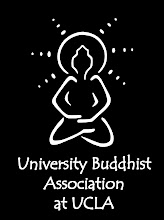

So I spent this past Saturday at a very interesting Tibetan Buddhist event run by one of my parents' friends and her Tibetan Buddhist group. It was held at a small suburban home in Rowland Heights, mainly in their backyard and living room furnished with Buddhist statues. Before we went, I was told by my parents that we were burning paper folded into lotus flowers for our ancestors. I spent Friday night making folding one of the lotus flowers using special ritual paper and writing the name of whom the flower was supposed to be given to. I've burned paper money for my ancestors many times as part of certain Chinese holidays so burning paper lotus flowers wasn't strange or new at all.
When we arrived at the house, I was first surprised to find that it was located at a small house - I was expecting some sort of temple. Also I was surprised to find the monastic leading the procession was a woman. We started setting up fruits, snacks, and vegetarian dishes in front of the statue of Guanyin, the Boddhisatva of Compassion also referred to as Avalokitesvara in Sanskrit. We also brought several small stations to burn the paper in. My mother helped the other women (most of the people there were women) fold the remaining lotus flowers and we started the procession.
The monastic chanted and read off names of the ancestors each household wanted to receive the lotus flowers. We burned incense and prayed before going into the house to chant. They chanted in Sanskrit, which I found extremely interesting because I've never heard it done before. After the chanting, the burning of the lotus flowers began and each household threw paper money and paper lotus flowers into the flames. By the time everyone finished burning their flowers, it was 8pm at night and they prepared the vegetarian dishes for everyone to share.
At first all this seemed quite odd and boring. The people attending the event seemed ridiculously superstitious, claiming to be able to communicate to spirits of the other world. The monastic individually confirmed to each household that their ancestors were present in the room while we were chanting using divination tools that looked like a pair of red, wooden apple slices. Many people that attended claimed to have come because they had dreams about loved ones who've passed away (even dogs) asking for the lotus flowers. Supposedly, my parents' friend told my dad that my grandfather told her he needed exactly 72 lotus flowers. For what reason? I don't know. In fact, most people there didn't seem to know what the purpose of the flowers were. Why are they burning lotus flowers? The closest thing I got to an answer was that it's equivalent to an upgrade for those passed away, like upgrading from economy to first class on an airplane. So at the end of the procession I asked the leader, the monastic.
She first warned me that she'd only be able to give me a simple description, since it's a very complicated tradition. And since she spoke in Chinese and I am attempting to paraphrase it in English, this will probably be an even more watered down version of her description. The point of burning the lotus flowers lies in their function to purify and rid one of suffering. She told me that many people who die are not able to complete the cycle of rebirth and remain as spirits on Earth. Sometimes its because of an illness they had in their previous life, sometimes its because of a problem that was left unsettled. But by burning the lotus flower, these spirits are able to treat whatever is preventing them from fulfilling the cycle of rebirth and go on to their next life.
At first, all this sounded, once again, ridiculously superstitious and disconnected from the Buddhism I am used to hearing about. I was hesitant to believe that by burning some paper flowers that we'd save wandering spirits and lead them to their next life. However, the monastic said something that finally made the connection between their specific practice in Tibetan Buddhism and the general, personal application of Buddhism with my own life. She told me that it's often not the paper flowers that help your ancestors but the heart that we put into making them. It's the compassion that one has for others - their family, their relatives, their friends - that is the most powerful force to rid them of their suffering. To me, that was something I could understand, and despite the fact that I may not be used to their traditions and rituals, I found the common ground that makes us all Buddhists and worth interacting with each other.
From the recent activities fair at UCLA and some flyers posted around campus, I've found three other Buddhist student groups on campus: one focused on meditation, one on chanting, and one on community service. Since UBA is mostly a discussion-based Buddhist student group, it seems as though all four Buddhist groups (and maybe more) have something unique to offer and share with the others. I hope we will be able to hold events where we can all meet and share our interests with each other.






No comments:
Post a Comment